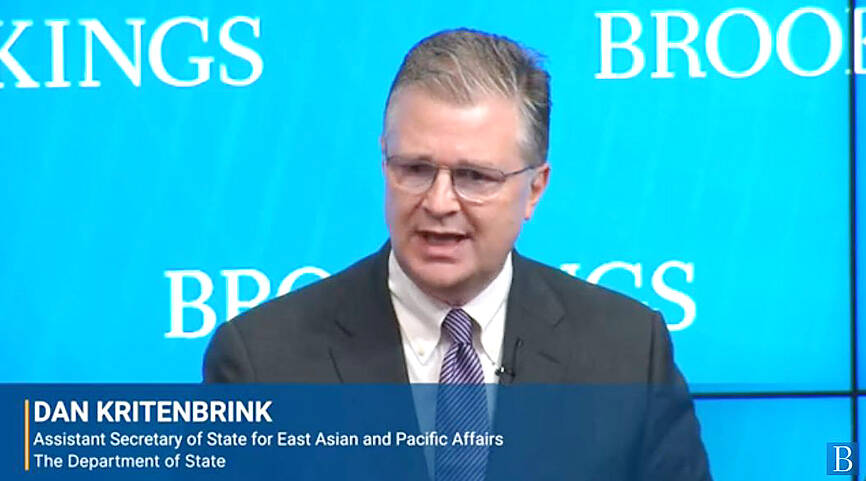Taiwan is central to the global economy, and preventing a crisis or conflict across the Taiwan Strait should be a matter of concern for all US partners, US Assistant Secretary of State for East Asian and Pacific Affairs Daniel Kritenbrink said on Friday.
Kritenbrink made the comment at a discussion on the importance of US alliances in the Indo-Pacific region hosted by the Brookings Institution in Washington, which was also attended by US Assistant Secretary of Defense for Indo-Pacific Security Affairs Ely Ratner.
Kritenbrink said the US is committed to investing in its allies and partners in the Indo-Pacific region, and assisting them in building the collective capacity to mange the challenges they face, as that is the best way to manage the China challenge, which affects them as well as the US.

Photo: Screengrab from the Brookings Institution’s YouTube channel
As part of Washington’s diplomatic push in the region, US Secretary of State Antony Blinken is traveling to Tonga, New Zealand and Australia next week, while US Secretary of Defense Lloyd Austin is departing next week to visit Papua New Guinea and Australia.
Regarding Taiwan, Kritenbrink said that the US is trying to make the point that maintenance of peace and stability across the Taiwan Strait should be a matter of international concern, as it is central to global security and prosperity.
“Fifty percent of the world’s container traffic flows to the Taiwan Strait, and 90 percent of the world’s high-end chips are made in Taiwan,” he said.
“Taiwan is central to the global economy,” Kritenbrink said. “Maintaining peace and stability and preventing a crisis or conflict across the Taiwan Strait should be a matter of concern for all of our partners in the region and around the world.
He said there has been no change to the US’ “one China” policy.
He said the US is committed to maintaining peace and stability, so its message to Beijing would be “to not challenge that status quo, to cease the provocative and coercive actions they have taken across the Strait and aimed at Taiwan.”
Ratner said he can see that Taiwan is committed to its own defense, as it has made a political commitment in terms of military and reservist reforms, and a substantial financial commitment with major increases in its defense budget.
“I look at what they do and how they are responding to the type of coercion they are under as a significant and reassuring sign of their commitment to their own resilience and defense,” he said.
Asked about his meeting with Chinese Ambassador to the US Xie Feng (謝峰) on Wednesday last week, Ratner said they “had a very good discussion,” but he refused to characterize the discussions.
“I will say what Secretary Austin has emphasized on a number of occasions, which is that the US continues to seek open lines of communication with the PLA,” he said, referring to the Chinese People’s Liberation Army.
“We think this is important for stability in peace time and during potential crises, and it is unfortunate that the PLA has not responded to that outstretched hand,” Ratner said.
“We are going to continue to encourage open lines of communication without preconditions,” he added.

The US government has signed defense cooperation agreements with Japan and the Philippines to boost the deterrence capabilities of countries in the first island chain, a report by the National Security Bureau (NSB) showed. The main countries on the first island chain include the two nations and Taiwan. The bureau is to present the report at a meeting of the legislature’s Foreign Affairs and National Defense Committee tomorrow. The US military has deployed Typhon missile systems to Japan’s Yamaguchi Prefecture and Zambales province in the Philippines during their joint military exercises. It has also installed NMESIS anti-ship systems in Japan’s Okinawa

‘WIN-WIN’: The Philippines, and central and eastern European countries are important potential drone cooperation partners, Minister of Foreign Affairs Lin Chia-lung said Minister of Foreign Affairs Lin Chia-lung (林佳龍) in an interview published yesterday confirmed that there are joint ventures between Taiwan and Poland in the drone industry. Lin made the remark in an exclusive interview with the Chinese-language Liberty Times (the Taipei Times’ sister paper). The government-backed Taiwan Excellence Drone International Business Opportunities Alliance and the Polish Chamber of Unmanned Systems on Wednesday last week signed a memorandum of understanding in Poland to develop a “non-China” supply chain for drones and work together on key technologies. Asked if Taiwan prioritized Poland among central and eastern European countries in drone collaboration, Lin

Renewed border fighting between Thailand and Cambodia showed no signs of abating yesterday, leaving hundreds of thousands of displaced people in both countries living in strained conditions as more flooded into temporary shelters. Reporters on the Thai side of the border heard sounds of outgoing, indirect fire yesterday. About 400,000 people have been evacuated from affected areas in Thailand and about 700 schools closed while fighting was ongoing in four border provinces, said Thai Rear Admiral Surasant Kongsiri, a spokesman for the military. Cambodia evacuated more than 127,000 villagers and closed hundreds of schools, the Thai Ministry of Defense said. Thailand’s military announced that

NO CONFIDENCE MOTION? The premier said that being toppled by the legislature for defending the Constitution would be a democratic badge of honor for him Premier Cho Jung-tai (卓榮泰) yesterday announced that the Cabinet would not countersign the amendments to the local revenue-sharing law passed by the Legislative Yuan last month. Cho said the decision not to countersign the amendments to the Act Governing the Allocation of Government Revenues and Expenditures (財政收支劃分法) was made in accordance with the Constitution. “The decision aims to safeguard our Constitution,” he said. The Constitution stipulates the president shall, in accordance with law, promulgate laws and issue mandates with the countersignature of the head of the Executive Yuan, or with the countersignatures of both the head of the Executive Yuan and ministers or